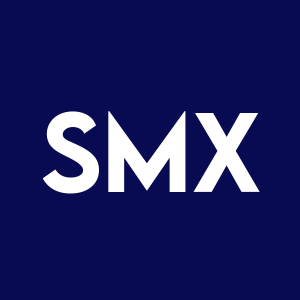Singapore's Model, Powered by SMX Technology, Set to Redefine ASEAN's $4.2B Plastics Market Opportunity
Rhea-AI Summary
SMX (NASDAQ:SMX) is powering Singapore's groundbreaking national plastic passport program, marking the world's first government-backed initiative of its kind. The program leverages SMX's molecular-level technology to create digital passports for plastics, enabling complete traceability of origin, journey, and recycling potential.
This initiative positions SMX to potentially capture a significant share of ASEAN's S$4.2 billion annual plastics market opportunity. The system's universal approach covers all polymer classes, from automotive resins to textiles, creating a comprehensive framework that could become the regional standard for plastic traceability and recycling.
Through its Plastic Cycle Token (PCT), SMX adds a tradable value component to the system, enhancing the economic incentives for adoption across the ASEAN region. Singapore's implementation serves as a proof-of-concept for broader regional adoption, potentially transforming SMX from a project implementer to a regional infrastructure provider.
Positive
- First-mover advantage in Singapore's national plastic passport program
- Potential to capture share of S$4.2B ASEAN plastics market
- Universal system covering all polymer classes, not just specific plastics
- Proven technology with successful implementations in other materials
- Tradable Plastic Cycle Token (PCT) adds economic incentive layer
Negative
- Regional adoption depends on multiple government buy-ins
- Success relies on cross-border cooperation in ASEAN
- Implementation across diverse manufacturing supply chains could be complex
News Market Reaction
On the day this news was published, SMX declined 6.62%, reflecting a notable negative market reaction. Argus tracked a peak move of +15.4% during that session. Argus tracked a trough of -9.1% from its starting point during tracking. Our momentum scanner triggered 11 alerts that day, indicating notable trading interest and price volatility. This price movement removed approximately $155K from the company's valuation, bringing the market cap to $2M at that time.
Data tracked by StockTitan Argus on the day of publication.
NEW YORK, NY / ACCESS Newswire / September 5, 2025 / Singapore has taken a bold step forward with the launch of its national plastic passport program, powered by SMX (NASDAQ:SMX) technology and its long-standing research partner ASTAR. It's the world's first government-backed initiative of its kind, one that doesn't just intend to boost recycling rates but to fundamentally rewire how value is created from plastics. What makes this moment more than a domestic breakthrough is its potential to become the blueprint for ASEAN, a region whose plastic waste challenge has both staggering costs and immense opportunities.
Singapore is small, but it rarely thinks small. By embedding molecular-level intelligence into plastics, the country has shifted recycling away from a patchwork of intentions toward a framework built on proof, traceability, and accountability. Every piece of plastic, regardless of grade or application, can now carry a digital passport verifying its origin, journey, and re-use potential.
That system design is precisely what Southeast Asia has lacked. The region collectively generates millions of tonnes of plastic waste each year, much of which ends up either incinerated or in landfills and waterways. According to regional estimates, ASEAN's plastics ecosystem represents an untapped S
Singapore's move offers a ready-made playbook for the region. It is not just a test case; it's a demonstration of what's possible when technology, government, and industry align. And ASEAN, with its integrated economic community and shared environmental priorities, is uniquely positioned to replicate and scale this model.
Building a Regional Standard Through SMX
The genius of Singapore's plastic passport system is its universality. Instead of chasing a handful of PET or rPET bottles and food-grade packaging, it brings every polymer class into scope-from automotive resins and construction plastics to textiles and electronics. That breadth matters in ASEAN, where manufacturing supply chains are deeply interconnected and where plastics are embedded across industries that export globally.
For regulators, a regional standard built on Singapore's model would provide uniform compliance tools that transcend borders. For brands, it delivers defensible proof that recycled content claims can withstand scrutiny from both customers and global regulators. And for ASEAN governments, it translates environmental ambition into measurable economic reward, monetizing what today is treated as costly waste.
SMX's role in this cannot be overstated. Its "physical-to-digital" system is not theory; it has already demonstrated traceability from tree to tire in natural rubber, and now from waste to high-value resin in plastics. By anchoring Singapore's national initiative, SMX has positioned itself not as a supplier but as an architect of frameworks. When replicated regionally, that positioning could make its technology the default standard for ASEAN: a position with immense staying power.
The Investor Lens: From Local Proof to Regional Scale
This is where the inflection point comes into focus. The ASEAN region is not dabbling in sustainability as a corporate social responsibility exercise; it is grappling with the direct costs of waste management, marine pollution, and lost material value. A S
The SMX technology Singapore is using proves that the tools exist. The question for the region is not if, but how fast.
For SMX, the leap from enabling Singapore to enabling ASEAN would be transformative. It would shift the company's role from project-by-project implementations to operating at the scale of regional infrastructure. Just as early movers in carbon credits or ESG reporting technology became category leaders that defined their markets, SMX now stands at the same threshold in plastics.
That is what makes Singapore less of an endpoint and more of a springboard. A national framework in one of the world's most forward-thinking economies is the first domino. The replication of that model across ASEAN is the chain reaction. If the region adopts Singapore's approach, SMX will not just be part of the system-it will be the system. And that makes the ASEAN plastics opportunity one of the most compelling growth catalysts in the company's story to date.
References
National Environment Agency (NEA). Waste & Recycling Statistics 2014 - 2023. Singapore: NEA; 2024.
Shunpoly.com. "How Much Plastic Is Wasted Each Year in Singapore?" Accessed 5 August 2025.
National Environment Agency (NEA). Waste-Statistics & Overall Recycling (interactive dashboard). Updated 2024; accessed 5 August 2025.
National Environment Agency (NEA). Mandatory Packaging Reporting portal. Accessed 5 August 2025.
Singapore Statutes Online. Environmental Public Health (Public Cleansing) Regulations - Incineration gate-fee schedule; revised 2024.
National Environment Agency (NEA). "New Licensing Regime for General Waste Disposal Facilities." Technical brief & dialogue-session slides; 2024.
Nasdaq.com. "SMX Announces Planned Launch of World's First Plastic Cycle Token." Press release; 2024.
Yahoo! Finance. "SMX Plastic Cycle Token Is a Functional Market-Driven Solution…" News article; 2024.
Los Angeles Tribune. "Carbon Credits Had Their Day… Now the SMX Plastic Cycle Token…" Feature article; 2025.
National Environment Agency (NEA). Refuse Collection Fees for Households. Revised 2024; accessed 5 August 2025.
About SMX
As global businesses face new and complex challenges relating to carbon neutrality and meeting new governmental and regional regulations and standards, SMX is able to offer players along the value chain access to its marking, tracking, measuring and digital platform technology to transition more successfully to a low-carbon economy.
Forward-Looking Statements
The information in this press release includes "forward-looking statements" within the meaning of the Private Securities Litigation Reform Act of 1995. Forward-looking statements include, but are not limited to, statements regarding expectations, hopes, beliefs, intentions or strategies regarding the future. In addition, any statements that refer to projections, forecasts or other characterizations of future events or circumstances, including any underlying assumptions, are forward-looking statements. The words "anticipate," "believe," "contemplate," "continue," "could," "estimate," "expect," "forecast," "intends," "may," "will," "might," "plan," "possible," "potential," "predict," "project," "should," "would" and similar expressions may identify forward-looking statements, but the absence of these words does not mean that a statement is not forward-looking. Forward-looking statements in this press release may include, for example: matters relating to the Company's fight against abusive and possibly illegal trading tactics against the Company's stock; successful launch and implementation of SMX's joint projects with manufacturers and other supply chain participants of gold, steel, rubber and other materials; changes in SMX's strategy, future operations, financial position, estimated revenues and losses, projected costs, prospects and plans; SMX's ability to develop and launch new products and services, including its planned Plastic Cycle Token; SMX's ability to successfully and efficiently integrate future expansion plans and opportunities; SMX's ability to grow its business in a cost-effective manner; SMX's product development timeline and estimated research and development costs; the implementation, market acceptance and success of SMX's business model; developments and projections relating to SMX's competitors and industry; and SMX's approach and goals with respect to technology. These forward-looking statements are based on information available as of the date of this press release, and current expectations, forecasts and assumptions, and involve a number of judgments, risks and uncertainties. Accordingly, forward-looking statements should not be relied upon as representing views as of any subsequent date, and no obligation is undertaken to update forward-looking statements to reflect events or circumstances after the date they were made, whether as a result of new information, future events or otherwise, except as may be required under applicable securities laws. As a result of a number of known and unknown risks and uncertainties, actual results or performance may be materially different from those expressed or implied by these forward-looking statements. Some factors that could cause actual results to differ include: the ability to maintain the listing of the Company's shares on Nasdaq; changes in applicable laws or regulations; any lingering effects of the COVID-19 pandemic on SMX's business; the ability to implement business plans, forecasts, and other expectations, and identify and realize additional opportunities; the risk of downturns and the possibility of rapid change in the highly competitive industry in which SMX operates; the risk that SMX and its current and future collaborators are unable to successfully develop and commercialize SMX's products or services, or experience significant delays in doing so; the risk that the Company may never achieve or sustain profitability; the risk that the Company will need to raise additional capital to execute its business plan, which may not be available on acceptable terms or at all; the risk that the Company experiences difficulties in managing its growth and expanding operations; the risk that third-party suppliers and manufacturers are not able to fully and timely meet their obligations; the risk that SMX is unable to secure or protect its intellectual property; the possibility that SMX may be adversely affected by other economic, business, and/or competitive factors; and other risks and uncertainties described in SMX's filings from time to time with the Securities and Exchange Commission.
EMAIL: info@securitymattersltd.com
SOURCE: SMX (Security Matters) Public Limited
View the original press release on ACCESS Newswire







